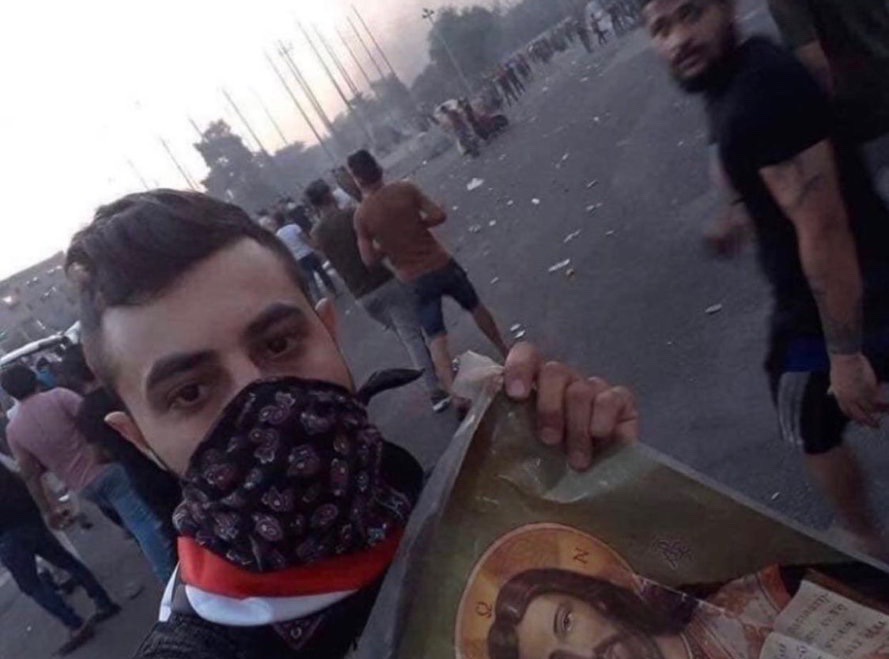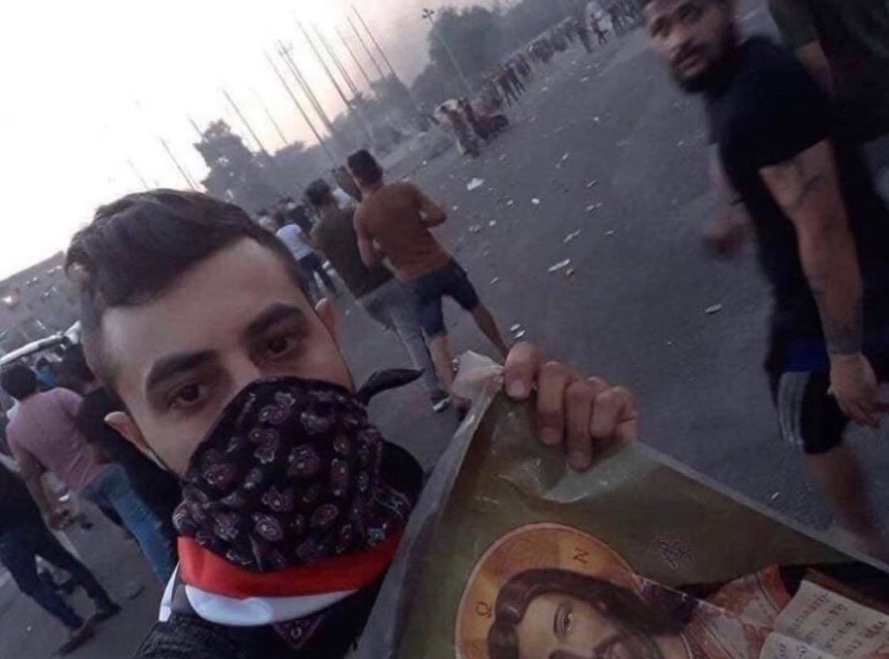
BREAKING: Unrest in Iraq
Iraq is facing its biggest emergency since the rise of ISIS. We speak with members of our team in Iraq to get the latest on the situation, why we should care, and what we can do about it.
Share this episode
Show Notes
Iraq is currently facing its biggest emergency since the rise of ISIS. Protests have erupted in Baghdad and other parts of the country, as young people, fed up with political corruption and a lack of opportunity, take to the streets.
At the time of recording, the numbers have grown to more than one hundred protesters killed in Baghdad and cities across Iraq. More than six thousand people are reported injured. Prominent religious leaders are calling for the government to step aside. And there’s a real fear that ISIS could exploit the situation to cause even more chaos.
But this crisis doesn’t just affect Iraq.
It affects all of us.
In this breaking episode, Ben Irwin speaks with two members of our team in Iraq, Erin Wilson and Ihsan Ibraheem, to get the latest on the situation, why we should care, and what we can do about it.

Iraq’s young people have so much promise and potential. We see it every day. We’re creating jobs and helping launch businesses that offer them another future—but it’s not nearly enough. We urgently need your help to create opportunities for young people across Iraq, so they aren’t consigned to a future of endless war.
We can be the generation that ends war—with and for the rising generation in Iraq. Join us.
Additional Resources
Full Transcript
Kayla: Iraq is currently facing its biggest emergency since the rise of ISIS. Protests have erupted in Baghdad and other parts of the country, as young people, fed up with political corruption and a lack of opportunity, take to the streets.
I’m Kayla Craig, and this is a special episode of the Love Anyway podcast.
MUSIC
Kayla: At the time of recording, the numbers have grown to more than one hundred protesters killed in Baghdad and cities across Iraq. More than six thousand people are reported injured. Prominent religious leaders are calling for the government to step aside. And there’s a real fear that ISIS could exploit the situation to cause even more chaos.
But this crisis doesn’t just affect Iraq. It affects all of us. My colleague Ben Irwin spoke with two members of our team in Iraq, Erin Wilson and Ihsan Ibraheem, to get the latest on the situation, why we should care… and what we can do about it.
Ben: So it is 11 p.m. on Friday night in Iraq, and my colleague Erin Wilson is there, and is here to talk about the crisis that’s unfolding currently.
Erin: The news comes in, in kind of waves. Like, very early this morning, there was some news from journalists. They were able to get information out…
Ben: So you mentioned that this is not the first wave of protest, what is different from your vantage point this time?
Erin: People here are just tired. They are tired of the corruption. The young people are tired of not having work. They’re tired of not having basic services like water and electricity.
Erin: I think that what’s so different this time is that it’s just, it’s just the people. It’s not being driven by a political agenda. They, they’re desperate for change.
Erin: And it’s I think it’s most concerning when the people feel like they’re not being heard. And they have no options left.
Ben: Iraq just went through an election, which saw historically low turnout for the post-Saddam era. And a lot of people said that they were just so fed up with the same story, the same people, kinds of people coming into office, not really delivering the kind of change and opportunity that ordinary Iraqis are looking for. So like, is there any hope that just, like, doing another round of elections would solve anything?
Erin: Really, I don’t know. But I do know that there have been very strong calls by people in power for patience so that reform can happen. And I think there’s just no appetite for reform anymore. They are looking for something different, something new. But I’m not sure where that’s going to come from.
MUSIC
Ihsan: So the rally began by several hundreds, and start to increase on the same day to thousands. The protest was initially peaceful. Security forces began to try to discuss the protesters by beating them with sticks, spraying them with hot water and tear gas.
Kayla: That’s Ihsan Ibraheem. He’s a part of our team in Iraq. You might remember him from season one of the Love Anyway podcast. Most of Ihsan’s family lives in the south of Iraq, close to the unrest.
Ihsan: The government has cut off the internet service and the roads leading to Baghdad, making it difficult to communicate and send pictures or videos that document what is happening, and keep the Iraqi citizens in isolation from the world.
Ihsan: More than 50 people were killed and more than a thousand wounded in Baghdad. Dozens died or wounded in the rest of the southern provinces.
Kayla: Those were the known figures as of Thursday night. The numbers are much higher as of today, Monday. There is also fear that ISIS will try to exploit the situation to cause further chaos. At the end of September, the Iraqi government removed several military commanders who were crucial to winning the war against ISIS. The head of Iraq’s elite counterterrorism forces was transferred to a lower-level position without explanation, adding fuel to the protests.
Erin: And so all the people who are responsible for really wrestling Iraq back from from ISIS are no longer in a position to use their experience or skills anymore.
Erin: It just leaves a totally open window for, for ISIS to continue on doing what they’ve been doing.
Kayla: It’s been so long since ISIS made headline news outside the Middle East, that it may be tempting to think they’re gone. But they are anything but gone.
Erin: The only thing that ended with the end of ISIS was the end of rule of territory of land. They no longer formed their own government. They no longer collected taxes. That kind of thing. But they’re still here. They haven’t gone anywhere.
Erin: There have been attacks, weekly, if not daily, in some parts of Iraq all along. They have not gone away.
MUSIC
Kayla: Young Iraqis are desperate. They’re desperate for some kind of control over their lives. Desperate to prove themselves. Desperate for a government that looks out for them and not just for itself. Desperate for a future that isn’t shaped by war.
Erin: The Iraqi people, the protesters are not demanding anything that any of us wouldn’t want for ourselves and our kids. Basic services, the chance to work, you know. Like, who of us don’t want that in our lives?
Erin: This doesn’t have implications for just right now, it has implications for at least two generations—what happens in Iraq right now. We don’t have the luxury of turning away. We all pay the price.
Erin: This is why we stand with them. This is why our work here continues to be so important. We know that Iraqis are, especially the young people here, are incredibly intelligent and savvy. They have so much promise and potential.
Kayla: The problems facing our friends in Iraq can’t be solved overnight. Iraq has known war for almost a whole generation—it takes time to mend wounds like that. But the lack of opportunity people are protesting right now is one of the biggest contributors to war. Which means, if we help create jobs for young people in Iraq right now, we can help them write a different future. We can actually start to end war.
Kayla: Or we can look away and do nothing… and watch as Iraq descends into yet another war.
Ihsan: Our belief is that job creation ultimately leads to the end of violence in Iraq. I fear that if this violence continue, it will lead to more violence.
MUSIC
Erin: These empowerment projects that we start here, these small business grants that we, that we disperse, these people that we work with here to help them realize their hopes and their dreams.
Erin: Really, I think that’s the most helpful way forward. And it’s through those very practical steps that they’ll know that they’re not forgotten. They’ll know that they’re loved the moment they matter. Because they do. They do matter.
Kayla: The people of Iraq urgently need you to stand with them. When you give, when you donate monthly to our work, you help create jobs for thousands of young Iraqis. You help them write a different future. Please stand with our friends in Iraq—and help stop the next war… before it starts. Go to preemptivelove.org/podcast, where you can easily donate. I’m Kayla Craig, and this is the Love Anyway podcast.

